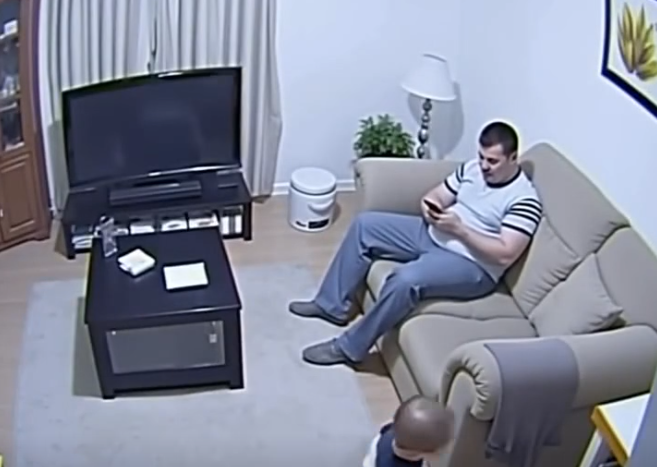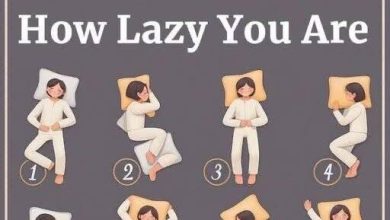
Caught on Camera: What My Husband Didn’t Know
It started as an ordinary evening — the kind that used to bring comfort. Our living room glowed softly from the warm light of a floor lamp, our daughter’s laughter faintly echoing from down the hall. I had set up a small home camera weeks earlier, mostly out of habit. It wasn’t about distrust; it was for safety, for peace of mind when I wasn’t home. But that night, as I scrolled through the footage, what I saw drained every bit of warmth from my body.
At first, it was nothing unusual. My husband sat on the couch, scrolling through his phone while our daughter played with her dolls on the rug. She giggled, showing him one of her make-believe tea sets. For a few seconds, he smiled the way he always did — the same easy smile that made me fall in love with him.
Then, something shifted.
His expression hardened, the muscles in his jaw tightening. He put down his phone slowly, his eyes fixed on her in a way that made my heart lurch. I leaned closer to the screen, my pulse quickening. There was no sound — the camera only captured video — but I didn’t need to hear his words to know that something was wrong.
He stood abruptly, towering over her small frame. His gestures grew sharp, impatient. Our daughter’s shoulders tensed; her smile vanished. She said something — a quiet defense, maybe an apology — but he only waved his hands, angry and dismissive.
I froze, unable to look away. The man I saw wasn’t the gentle, patient father I knew. His face twisted with irritation, his movements rough and unrecognizable.
Then it happened.
He reached for her arm — not in play, not by accident — and pulled her toward him. It wasn’t a hit, but it was enough. Enough to make her flinch. Enough to make her eyes fill with tears. She tried to wriggle free, her tiny hand pushing weakly against him. He said something sharp, and for a moment, his grip tightened before he let go. She stumbled backward, sobbing.
I stopped breathing.
This was the man who once sang her to sleep. The man who cried in the hospital when she was born. The man who used to hold both of us like we were the only things that mattered.
Now, he stood there, rubbing his face, frustrated — as if she were the problem, as if her tears were noise. He sat down again, picked up his phone, and scrolled as she ran to her room.
The silence on that footage felt louder than any scream.
I replayed it again and again, hoping I’d misread something. Maybe he’d just been startled, or stressed. Maybe I was seeing more than there was. But every time, the same truth stared back at me. His anger wasn’t momentary. It was deliberate. It was control.
I sat there, shaking, questions flooding my mind. When had this started? Was this the first time — or just the first time I’d seen it? Had my daughter been hiding her fear from me? Had he been hiding this side from both of us?
For years, I’d thought I knew everything about him. He’d always been composed, dependable, a little distant at times but never cruel. Lately, he’d been quieter — buried in work, withdrawn, easily irritated. I’d blamed the stress, the bills, the endless grind of trying to stay afloat. I’d told myself it was temporary. Everyone goes through rough patches.
But watching him on that screen, I realized the truth: something inside him had broken long before that night.
My first instinct was rage. I wanted to storm into the living room, scream, demand an explanation. But my daughter came first. She was the one who’d flinched. She was the one whose trust could crumble if I didn’t act carefully.
I needed to be smart.
So I saved the footage, transferred it to a private drive, and sat on the edge of my bed for hours, trying to breathe through the storm of emotions — anger, confusion, fear, heartbreak. I didn’t want to believe he’d crossed that line. I wanted to find a reason, a cause, something to fix.
The next morning, I called a family counselor — someone neutral, someone who could help me figure out how to protect my child without destroying her world in one blow. I didn’t tell my husband right away. I needed professional guidance first, to understand whether this was a moment of stress or a pattern of danger.
When the counselor asked what made me reach out, I hesitated for a long moment before saying quietly, “Because I saw who he really is when he thought no one was watching.”
The counselor’s tone softened. “You did the right thing. Your daughter’s safety comes first. Always.”
Over the next few days, I watched him closely. I noticed things I’d missed before — how quickly his patience frayed, how he spoke to her with clipped words instead of warmth. But there were moments, too, when guilt flashed across his face. I could see it, even if he didn’t acknowledge it. He’d catch himself, look at her almost apologetically, and then retreat into silence.
Maybe he hated himself for losing control. Maybe he didn’t know how to stop. But apologies unspoken don’t undo fear. And fear had already taken root in our home.
One night, after putting our daughter to bed, I sat across from him at the kitchen table. “We need to talk,” I said.
He looked up, wary.
“I saw what happened,” I said quietly. “I saw you on the camera.”
His face went pale. “It’s not what it looked like,” he started, voice shaking. “I just—she wasn’t listening, and I—”
I stopped him. “Don’t justify it. I don’t care what she did. You don’t get to do that to her.”
He stared at me, shame flickering behind his eyes. Then he buried his face in his hands. “I’m sorry,” he whispered. “I didn’t mean to hurt her. I just… I can’t control it sometimes.”
Those words chilled me more than the footage had.
Control. That’s what this was about. And losing it was something he couldn’t keep pretending was harmless.
That night, he agreed to start therapy. Not for appearances, not to save face — but because I told him he wouldn’t live under the same roof as us unless he did.
I moved our daughter into my mother’s house for a while. The counselor helped us begin family sessions, though every conversation felt like navigating glass. There were no quick fixes, no easy forgiveness. Healing wasn’t a single act — it was a long, painful climb out of something we hadn’t realized we were drowning in.
Months later, I can’t say everything’s perfect. Maybe it never will be. But I know this: the moment I pressed “play” on that footage changed everything. It shattered illusions but also saved us from something that could have grown far darker.
I used to think love meant loyalty no matter what. Now I understand — love also means protection, truth, and the courage to face what you don’t want to see.
That night, when my husband thought no one was watching, the camera caught more than an outburst. It caught a warning — and a chance to rebuild, not with blind faith, but with honesty.
And as painful as that truth was, I’m grateful I saw it. Because sometimes the moment that breaks your heart is also the one that saves it.




